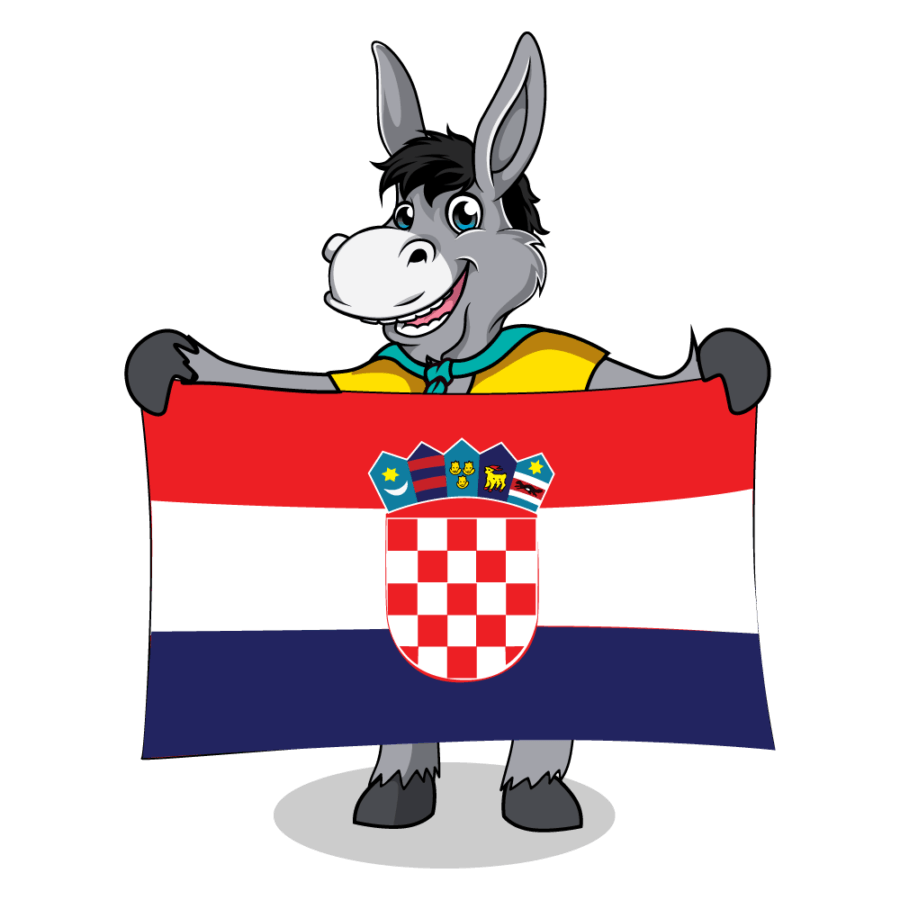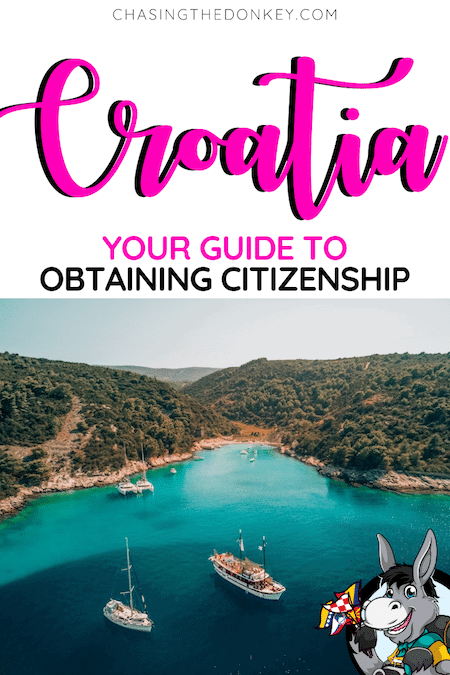More and more people choose Croatia as a destination for holidays, but many are also choosing to relocate to this beautiful country. It’s not hard to see why – long, hot summers, relatively mild winters (at least compared to everywhere else), fantastic food, culture, friendly locals, and stunning scenery.
For many years it was the case that anyone who wanted to obtain citizenship in Croatia had to be able to demonstrate a grasp of the Croatian language. Croatian isn’t the most straightforward language to learn. When this requirement was taken away, the number of people who began to seriously consider looking into citizenship via family lineage increased.
For those who have family ties with Croatia, the possibility to apply for citizenship has become a little easier. There are still many requirements that need to be met and a lot of paperwork to fill out, but with help and advice, this can be achieved.
If you have a grandparent or perhaps a first-degree parent who is Croatian and you want to look towards taking this step, you first need to do your research.

Things To Know Before Applying For Croatian Citizenship
Who Can Apply?
Croatian citizenship is available to those who have Croatian family ties, e.g., a parent or grandparent and those who are married to a Croatian citizen. There are rules which set out the finer details of both situations. However, it is also possible for a spouse of an applicant to apply for citizenship too. For instance, if you apply for citizenship because your grandparent is Croatian, your married partner can also apply as part of your application. You do not need to be living in Croatia in this situation.
There is a citizenship route available for anyone who is not originally from Croatia and marries a Croatian citizen. In this case, you would need to live with your Croatian partner in the country for five years, without breaks. You would need to obtain permanent residency first, and from there, you can apply for citizenship.
Citizenship For Children Of Croatian Nationals
Children of Croatian nationals do not need to go through the same drawn-out process of applying for citizenship, and in this case, they can simply request it instead.
This can be done if you meet the following:
- Your date of birth is after 18 October 1991, and you are under 21 years of age. Your parent (one or both) was a Croatian citizen when you were born.
- You have until 31 December 2022 to request citizenship if your date of birth is after 18 October 1991 and you are over 21 years of age. Your parent (one or both) was a Croatian citizen when you were born.
Croatian And Non-Croatian Names Must Be Identical
A very common problem arises when applying for citizenship through family ties. When a Croatian emigrates to another country, especially a country such as the UK, Australia, or the USA (English-speaking), their Croatian name is changed slightly, taking out the Croatian characters and fitting in with the English alphabet.
When submitting paperwork as part of your citizenship application, your name must be the same as your relative’s. For example, if your relative’s surname is Marić in Croatia and it is written that way on all paperwork, but your surname was modified to Marich, simply because you are living in an English-speaking country, those names don’t match, and you’ll run into problems. Prior knowledge of this issue is vital because you then need to either show a document that proves your original family name and the change, or you need to get your name changed back to the original Marić, therefore matching.
For those without Croatian characters in surnames, this isn’t usually an issue.
Some Relative Links Do Not Give You Automatic Right to Apply
 You also need to check that your relative link makes you eligible for citizenship in the first place. There are certain situations in which this isn’t the case.
You also need to check that your relative link makes you eligible for citizenship in the first place. There are certain situations in which this isn’t the case.
You are not eligible for citizenship if:
- Your family member left for another former Yugoslavia country
- Your family member left the country after the start of the war for independence (8 October 1991) – Their location after this point doesn’t matter; it is the date they left that causes the issue
For family members who left Croatia and went to other European countries, your right to apply for citizenship should still be acceptable, as there is nothing in the law that specifies a denial reason. However, this isn’t always the case, and there can be anomalies. It’s best to speak to an immigration specialist and double-check your case if you have any queries at all.
You Must Apply At Your Local Consulate
If you are applying for citizenship because you are married to a Croatian, and you’re living in the country, you must apply at your local consulate within the country. However, if you are not currently residing in Croatia, then you need to apply for citizenship at your nearest consulate building. This has to be the case and cannot be that you travel to another city to apply.
However, the consulate you hand your documents into aren’t the ones that process your application and decide. Your paperwork will be sent to Zagreb regardless of where you live. The issue can be that some consulates vary in terms of their requirements, and there is no standard ‘across the board’ set of rules. For that reason, you should contact your local consulate and get a list of their specific requirements. Your application could be rejected otherwise.
Criminal Charges Will Prevent Your Application From Being Approved
Every application needs a background check, and this needs to come from the country you live in. While small issues on a background check shouldn’t be an issue, if your background check brings to light any charges of a criminal nature, you will not be successful in your application.

Foreign Documents Must Be Apostilled
If you are submitting any foreign document as part of your application (which is very likely), you need to get these documented apostilled. This is an official stamp and seal that validates the document and gives the Croatian authorities confidence that the paperwork you’re submitting is official and reliable. The apostille usually comes as a certificate which you attach to the original document.
For instance, if you were not born in Croatia, then your birth certificate will need to have an apostille attached to it when applying. The critical thing to remember is that any apostille needs to be less than six months – the age of the document isn’t an issue, but the age of the apostille is.
A Note About Naturalisation
For those who have lived in Croatia for enough time, there is the opportunity to naturalize. However, there are some catches here and some people who this won’t be possible for. EU nationals cannot naturalize anyone with a Croatian spouse cannot naturalize and anyone with Croatian history.
Naturalization is not something to be taken lightly as it will require the person concerned to relinquish their nationality and, as a result, replace it with Croatian citizenship.
Applying for Croatian citizenship is a long process and one which requires due care and attention. Missing any documents from your application can mean a long delay or may even cause a refusal. It’s best to seek advice from an immigration specialist if you have any queries at all or contact your local consulate for requirements and other general queries.
- Guide To Being A Digital Nomad In Turkey
- How To Live In Croatia As An American
- Digital Nomad Visa Requirements
- 11 Facts About The Croatian Language
- Speaking Croatian: Guide To Getting Around Croatia
- Speaking Croatian: Guide To Ordering Food In Croatia
- 7 Things To Know Before Starting To Learn Croatian
- Social Distance Friendly Travel Ideas For Croatia
- Guide To Europe’s New ETIAS


Hi,
My father’s father was from Croatia. My father will be applying for Cro citizenship soon and is wondering if he can apply for my mother to obtain Cro citizenship as well. They have been married since 1998.
Thank you.
Not with the current rules, she should have done that many years ago when it was possible. Right now sposes have to live in Croatia for 4+ years to be eligible.
My grandfather was born in 1924 in Parenzo, my grandmother 1927 in Fiume. Then my mother in 1947 Fiume/Rijeka.. my mother’s birth certificate is Republic of Croatia… but it’s half in Italian half Croatian. My grandparents paperwork is all in Italian, and stamped Italian. They left for Italy in 1949 as refugees. My mother insists they were always Italian, even though her birth certificate says Croatia?? She is now Canadian, and so am I .. where do I stand trying to apply for Croatian citizenship?
Thanks
If it says Croatia, then she is Croatian – and you can apply via her paperwork. In Istria things are always in Italian and Croatian so that’s normal. Good luck.
Hello,
Does this “name must match” rule apply only for surnames? My great-grandparent first name was Franjo on his Croatian records, but on every family document from my home country his first name is Franz. Should this be a problem for the Croatian citizenship process?
Yes, it could be, you’ll have to ask.
Hi
I hope you are well?
Firstly thank you for all the valuable information on your website, its amazing.
I am so close to applying for my Croatian Citizenship, but so ever confused with a few points.
1. I am unclear which application form to use? very confusing….
2. What is the difference between me applying under article 5 vs article 11?
3. Article 5 and article 11 seem to be different application forms?
My father was born in Gornje Bazje, Virovitica in 1950. During the year of 1969 he left home and spent a few years in Europe before moving to South Africa in 1971 where he met my mother. They were married in 1975 and my brother and I were born there. I was born in 1979 so 42 years old now.
So my father currently has a current Croatian passport, his birth Certificate (Rodni List) and also his Domovnica.
My brother has managed to get his Croatian passport and citizenship too in 2012.
I have prepared my Birth and marriage certificate from South Africa, and police clearance and have all been apostilled. and also my full CV translated.
I just need some guidance on which application form and under which claim I should apply?
I have correspondence from the Croatian Embassy in London where I will apply but the information is just not clear.
Thanks again.
My question has to do with ethnic Croatian status.
My mother in law is from Bosnia-Herzegovina. She believes the family came from Croatia. How can I find out if she qualifies as an ethnic Croatian?
Cheers
Look at her birth certificate, see what town it says she was born in – then check the map.
I was born in Croatia, migrated to Australia in 1969 at the age of six. Two questions ;
1) Am I regarded as a Croatian Citizen
2) My daughter was born in Australia and is very interested in Croatian Citizenship, she is 17 years old.
What paperwork is required to obtain citizenship
What is the best way to apply and quickest
Thank you in advance
Vesna
1. You’ll need to get your Domovnica, and yes you will be
2. She can apply once you have your domovnica.
Hi SJ,
Thanks for this informative article and for your website in general, I appreciate the effort you put in.
I have a question about spousal privileges: My husband (G) and I hold Australian passports. His father was born in Croatia to Croatian parents which means that G can apply for Croatian Citizenship. Can I too? You noted:
“it is also possible for a spouse of an applicant to apply for citizenship too. For instance, if you apply for citizenship because your grandparent is Croatian, your married partner can also apply as part of your application”.
I look forward to your insights!
Keep well,
K
Yes you can, after 5 years of continuous living in Croatia, and sitting a few exams in Croatian.
Hello chasingthedonkey.com
I want to know if you know of any closing date for applying Croatian citizenship via Article 11?
Or is there no time limit for applying and applications for citizenship via this route is open indefinitely?
Thank you
What background check specifically is required for the citizenship process? I am just starting my application process, however, my mother has been denied twice due to her background check not being the correct one. Unfortunately, our Consulate is unable to provide me with that information either and I am just trying to figure it out.
Everyone I know used the National Police check from their country.